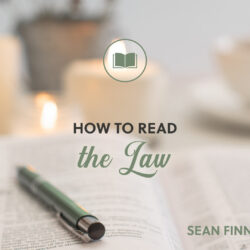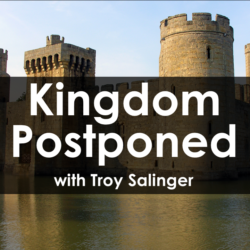This is part five of a series of posts called Habits of a Disciple.
As I stood on the sidewalk, relieved that the heat of the summer day had finally passed, the sounds and sights of the street washed over my senses like a tidal wave over a levee. Everywhere people were spilling out onto the sidewalk and the road from the shops along the road, the smell of alcohol on their breath. Scantily clad women with enticing gazes beckoned passersby to enter the seedy storefronts behind them. I was on Bourbon Street in New Orleans for the first time. I remember it as a string of bars and strip clubs, one after the other, as far as the eye could see. None of these establishments were content to allow people to saunter in of their own volition; rather they each had ambassadors, usually attractive women in suggestive clothing, heralding and inviting us to enter. The energy of the place was electric. Policemen milled around among the throng utterly unconcerned and unimpressed by this Thursday night’s debauchery. Initially I was curious to see what Bourbon Street was like and figured that a Thursday night would steer me clear of the excesses of the weekend scene, but I was utterly unprepared, spiritually speaking, for the assaulting brazenness that lay before me. About a third of the way down the block I established a goal of merely making it to the end of the road without sinning either in my mind or by getting sucked into one of the establishments lining the sidewalk. The group I was with offered little help. In fact, a couple of them were quite interested in patronizing one of these places. All I could do was press on, one foot in front of the other, eyes averted until I could make it to the end of the block.
Peer pressure is a powerful force. I’m the type of man who thinks he can retain his own individuality and buck the crowd when they’ve gone down the wrong path. I think of myself as a strong Christian who can stay faithful when faced with anything. Even if everyone else on the planet falls to their knees and worships the beast, even if I’m the only one left, I will stand. I imagine that with God on my side, I don’t need anyone else to keep me faithful and true. Furthermore, I’m a great commission Christian. I don’t just believe the gospel, but I believe I should share it with others. My original intention that night in New Orleans was to witness—speak to people about God’s coming kingdom. However, a mere five minutes into my walk down the road and that dream vanished like a mirage in the desert. By the time I got to the end of the road and we turned off to find a “normal” place to eat, my spiritual battery was completely drained and it was all I could do to merely not sin let alone be an agent of reconciliation. However, if I had one—even one—fellow brother or sister who would have stood next to me in solidarity, I know everything would have been different.
We need each other; we can’t do it on our own. Throughout more than a decade of ministry, I’ve seen it happen over and over. Someone stops coming to the Sunday service and she thinks to herself, “I’m fine. Missing church is not a sin. What matters is my personal relationship with God.” Then one week turns into two and three. After a while it gets hard for her to come back. She gets worried about what people will say. Will they ask her, “Where have you been? Why haven’t you been coming?” She prides herself in thinking, “I don’t need them. Christianity is not about going to church. It’s about loving God and loving people. If anyone dares to ask me why I don’t go on Sunday, I’ll reprove them for judging me. After all didn’t Jesus say, ‘Judge not, that you be not judged’” (Matthew 7.1)? As time passes, she reads the scriptures less frequently and prays fewer and fewer times throughout the day. She stops praying during meals because she doesn’t want to show off or be a hypocrite. Her time fills up with other activities both work-related and recreational. After some months she begins tolerating behaviors that she once would have called sinful. Now she has been apart from the people of God so long that she hardly thinks about them at all. She has her own life, her own friends, her own adventures and dreams. She fits in better than before. She feels well-adjusted whereas she used to feel like a fish out of water around worldly people. Then Easter comes. She thinks to herself, “I should go to church.” But then immediately argues back, “But I don’t want to be one of those Easter Christians that just comes once a year!” Maybe she goes, maybe she doesn’t, but she has already fallen away. Her fire has not just dwindled, it has gone out. Sin no longer convicts her soul nor does she hunger and thirst for righteousness anymore.
Or sometimes it happens more like this. He loved spending time with God’s people. He went to mid-week bible study, to the Sunday service, and even the biblical education classes. He couldn’t get enough God in his life. He flourished in his relationship with God and others. He overcame huge sin patterns in his life and God set him free from bonds that had dogged him since childhood. Then came the offense. A fellow “brother” said something insensitive. As he mulled it over, it snowballed in his mind until he was furious. “How could he say that? I don’t need this. I’m not going to take this from him or anyone!” He spoke to others in the church about it but no one would champion his cause; no one would go as far as he thought; no one would rise up and wage holy war on this buffoon. His friend told him to forgive, citing the scripture, “If you don’t forgive others their trespasses, neither will your father forgive your trespasses” (Matthew 6.16). He can’t believe that no one will cut this person off, never mind that he had already apologized and asked for forgiveness. “I’m out of here. I’ll show them.” He withdraws from the saints and at first succeeds in the world. Now that he’s not spending so much time volunteering to help the needy, studying the bible, and trying to reach the lost, he can throw himself fully into his work. He works late; he works on weekends; he refuses to take vacation. Over time the money comes. He starts to get ahead in life. He doesn’t need anyone else. He is the master of his own destiny. He runs into someone from the church a year later and she greets him warmly and asks how he is doing. He replies, “Life is good. Look at my new car.” The former sister chokes back tears at seeing how much this once ardent God-lover has changed. “What about God? How’s your spiritual life?” she asks. He doesn’t give a straight answer but drives off, thinking to himself, “Spiritual life. Who does she think she is, talking to me like that?”
I see these two scenarios played out with varying details over and over and it breaks my heart. Persevering is not easy. We are prone to wander as the hymn put it. We need each other. After all, it’s not how you begin the race that matters, but how you end it. Jesus has already told us that many will approach him on judgment day, saying, “Lord, Lord, did we not prophesy in your name, and cast out demons in your name, and do many mighty works in your name?” These are not a bunch of fakers that come to him confessing “Lord, Lord.” They cast out demons in the name of Jesus; they prophesied in the name of Jesus; they performed miracles in the name of Jesus. Even so, Jesus condemns them because they did not obey the will of his father in heaven (Matthew 7.21-23). We cannot rest on our laurels, remembering all the great things we did for God in years past. Of course it’s not wrong to enjoy nostalgia for a time, but we dare not use it as an excuse to not live for God today. Jesus has already said that many will come to him—many—and point to their past exploits as evidence for why they are ok. Jesus has already told us what he is going to say on the last day: “Depart from me, you workers of lawlessness” (Matthew 7.23). Even if we dismiss all of the other sayings of Jesus, it is nothing short of suicide to ignore what the judge himself says about the day of judgment. He once asked, “Why do you call me ‘Lord, Lord’ and not do what I tell you?” (Luke 6.46). We must persevere; we must hold fast; we must continue following Jesus. We cannot let awkwardness or offenses or a thousand other excuses dissuade us from joining God’s people for encouragement, teaching, and correction. We need each other.
The book of Hebrews addressed a situation where many of the early Christians were tempted to give up on Jesus and return to Judaism. Repeatedly the author implores them to hold fast. “For we have become partners with Christ, if in fact we hold our initial confidence firm until the end” (Hebrews 3.14). How do we hold fast? How do we persevere? How do we hold our initial confidence firm until the end? Fellowship. Consider these verses:
Hebrew 10.23-25
23 Let us hold fast the confession of our hope without wavering, for he who promised is faithful. 24 And let us consider how to stir up one another to love and good works, 25 not neglecting to meet together, as is the habit of some, but encouraging one another, and all the more as you see the Day drawing near.
Let’s make an effort to get together. We don’t want to be like the hot coal separated from the fire that glows bright red for a little while, but then steadily loses its heat until it’s completely cold. We need each other to stoke the flames of our passion for our God and his Christ. We need each other to call us out when we stray from what God says it right. We need each other to gently support and comfort one another when we go through periods of suffering and grief. Let’s pray together, read scripture together, and share our lives together so that we can draw strength from the body of Christ and do exploits for our God today!
Read part six: Evangelism







